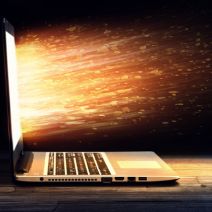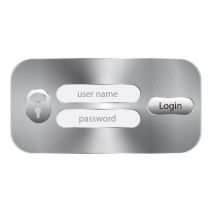What you watch on TV says a lot about you; so much so, that you might be creeped out if we told you there are others who know exactly what you watched, without your consent. Sound too invasive to be true? Well, for the 11 million owners of Vizio televisions, this practice has been going on for some time now.
Britek Solutions Blog
Hackers are always trying to come up with new ways to steal or corrupt sensitive data. If you don’t take the opportunity to protect your systems, you could be staring down a major data loss incident or security discrepancy. Here are five ways that you can protect your business’s infrastructure from hackers waiting to steal your data.
As technology advances and allows for common pain points to be corrected, many of today’s most well-known entities will adopt new solutions to ease the experience of their customers and clients. Take, for example, eBay. The famous reselling site has been taking steps to install an assortment of new features to improve its customers’ experience.
Augmented reality is a growing trend in the technology industry, and perhaps one of the best known uses of it today can be found in the extremely popular mobile device app, Pokemon Go. However, hackers have seized the opportunity to infect players who want to “catch ‘em all” with a backdoor called DroidJack - something that certainly won’t help gamers “be the very best.”
 Hackers have always gone after industries that are profitable, or hold sensitive information that can be lucrative when sold under the table. As such, retailers that accumulate financial credentials are often hit by hacks. The entertainment industry is no different, and hackers continue to grow craftier in their pursuit of wealth and power. Not even Steam, the PC gamer’s most valuable software solution, is safe from the dangers of hacking attacks.
Hackers have always gone after industries that are profitable, or hold sensitive information that can be lucrative when sold under the table. As such, retailers that accumulate financial credentials are often hit by hacks. The entertainment industry is no different, and hackers continue to grow craftier in their pursuit of wealth and power. Not even Steam, the PC gamer’s most valuable software solution, is safe from the dangers of hacking attacks.
 Businesses all over the world are taking advantage of two-factor authentication, causing the password’s value to depreciate over time. Passwords aren’t powerful enough to keep users safe from advanced threats. Hackers are finding ways to punch holes in even the most comprehensive security solution, forcing users to focus on improving security through other means.
Businesses all over the world are taking advantage of two-factor authentication, causing the password’s value to depreciate over time. Passwords aren’t powerful enough to keep users safe from advanced threats. Hackers are finding ways to punch holes in even the most comprehensive security solution, forcing users to focus on improving security through other means.
 If you are a technician and a network you are responsible for begins to go down because the traffic that is coming into the network is unusually high, there is a good chance you are experiencing a distributed denial of service attack, or DDoS. These attacks, which are extraordinarily difficult to prevent altogether, can be exceedingly costly for a business.
If you are a technician and a network you are responsible for begins to go down because the traffic that is coming into the network is unusually high, there is a good chance you are experiencing a distributed denial of service attack, or DDoS. These attacks, which are extraordinarily difficult to prevent altogether, can be exceedingly costly for a business.
 Password security is a common problem that businesses that take their cybersecurity seriously have to deal with on a regular basis. Passwords need to be complex and difficult to guess, but easy to remember at the same time. Unfortunately, these two goals don’t go hand-in-hand, and as such, users often have to sacrifice one for the other. The “passpoem” is a concept born to resolve this issue, though it takes a pretty roundabout path of doing so.
Password security is a common problem that businesses that take their cybersecurity seriously have to deal with on a regular basis. Passwords need to be complex and difficult to guess, but easy to remember at the same time. Unfortunately, these two goals don’t go hand-in-hand, and as such, users often have to sacrifice one for the other. The “passpoem” is a concept born to resolve this issue, though it takes a pretty roundabout path of doing so.
 We write about cyber security all of the time, and for good reason. You need to be sure that your organization’s defenses are bulletproof, or at least optimized for maximum security. A recent debacle in the United States serves as a reminder that even high-level, super-secret government accounts can be hacked, like this story from the Central Intelligence Agency (CIA).
We write about cyber security all of the time, and for good reason. You need to be sure that your organization’s defenses are bulletproof, or at least optimized for maximum security. A recent debacle in the United States serves as a reminder that even high-level, super-secret government accounts can be hacked, like this story from the Central Intelligence Agency (CIA).
 How overwhelming is the amount of spam and junk mail you receive on a regular basis? Are you able to effectively navigate your inbox without wasting time on unimportant messages? If you’re a user of Gmail, you now have some tools available to you by default that can help you in the war on spam. You can block specific users and even unsubscribe from email campaigns, allowing you to take back time previously spent cleaning up your inbox.
How overwhelming is the amount of spam and junk mail you receive on a regular basis? Are you able to effectively navigate your inbox without wasting time on unimportant messages? If you’re a user of Gmail, you now have some tools available to you by default that can help you in the war on spam. You can block specific users and even unsubscribe from email campaigns, allowing you to take back time previously spent cleaning up your inbox.
 The social media revolution has taken the world by storm, so much in fact that some people are completely at the mercy of their smartphones. However, the dark side of social media, especially Facebook, grows more apparent every day, especially when it comes to both cybersecurity and personal privacy. Are you sure that your Facebook settings aren’t giving away a little too much of your information to the powers that be?
The social media revolution has taken the world by storm, so much in fact that some people are completely at the mercy of their smartphones. However, the dark side of social media, especially Facebook, grows more apparent every day, especially when it comes to both cybersecurity and personal privacy. Are you sure that your Facebook settings aren’t giving away a little too much of your information to the powers that be?
 It’s been two years since the world was introduced to CryptoLocker, a particularly-nasty ransomware that encrypts a computer’s data while giving the user a deadline to pay a ransom for the encryption key, or else have their data destroyed. What we’re seeing now is that the reach of CryptoLocker is extending beyond the average PC user; even gamers are getting owned by Cryptolocker.
It’s been two years since the world was introduced to CryptoLocker, a particularly-nasty ransomware that encrypts a computer’s data while giving the user a deadline to pay a ransom for the encryption key, or else have their data destroyed. What we’re seeing now is that the reach of CryptoLocker is extending beyond the average PC user; even gamers are getting owned by Cryptolocker.
 Thieves stealing mobile devices like laptops and smartphones have reached epidemic proportions. In fact, 2013 statistics from Consumer Reports and LoJack show that two million laptops were stolen that year, along with three million handsets. Translation; it’s way more likely for your mobile device to be stolen than you probably realize.
Thieves stealing mobile devices like laptops and smartphones have reached epidemic proportions. In fact, 2013 statistics from Consumer Reports and LoJack show that two million laptops were stolen that year, along with three million handsets. Translation; it’s way more likely for your mobile device to be stolen than you probably realize.
 Every business executive knows the struggle of employee turnover. Your employees might come and go, but your data is one thing that you can’t afford to lose from your business. You might feel that you can trust all of the employees who have put in years of effort to ensure your organization stays afloat, but you may be surprised to learn that a significant number of them will probably leave your company with at least some corporate data.
Every business executive knows the struggle of employee turnover. Your employees might come and go, but your data is one thing that you can’t afford to lose from your business. You might feel that you can trust all of the employees who have put in years of effort to ensure your organization stays afloat, but you may be surprised to learn that a significant number of them will probably leave your company with at least some corporate data.
 With plenty of new features to throw around, Windows 10 is shaping up to be quite the operating system. One feature that seems to have fallen off of everybody’s radar (so far) is Windows Hello, a brand new way to authenticate your PC login. By taking advantage of biometric scanning, your computer will let you log in just by looking at your face.
With plenty of new features to throw around, Windows 10 is shaping up to be quite the operating system. One feature that seems to have fallen off of everybody’s radar (so far) is Windows Hello, a brand new way to authenticate your PC login. By taking advantage of biometric scanning, your computer will let you log in just by looking at your face.
 Network security entails a ton of different procedures, and it can be easy to lose track of what you’ve already implemented, and what still needs to be done. Instead of worrying about keeping your business’s confidential data safe, know with certainty that it’s as secure as possible by following our security checklist.
Network security entails a ton of different procedures, and it can be easy to lose track of what you’ve already implemented, and what still needs to be done. Instead of worrying about keeping your business’s confidential data safe, know with certainty that it’s as secure as possible by following our security checklist.
 When you think of the Internet of Things, does your mind immediately wander into the realm of connected devices that change the way we interact with each other? Or, does it consider the security issues that can potentially become a threat to your entire network and technology infrastructure? Hopefully it’s a little of both, with an emphasis placed on security.
When you think of the Internet of Things, does your mind immediately wander into the realm of connected devices that change the way we interact with each other? Or, does it consider the security issues that can potentially become a threat to your entire network and technology infrastructure? Hopefully it’s a little of both, with an emphasis placed on security.
 Just like Silk Road (the illegal online black market designed to smuggle drugs around the world), there exists an online trade for zero-day exploits. Unsurprisingly, hackers find it exceptionally lucrative to sell these exploits for profit. Now, there’s a new marketplace where hackers can get their hands on these vulnerabilities, and it’s all thanks to the anonymity of the Darknet.
Just like Silk Road (the illegal online black market designed to smuggle drugs around the world), there exists an online trade for zero-day exploits. Unsurprisingly, hackers find it exceptionally lucrative to sell these exploits for profit. Now, there’s a new marketplace where hackers can get their hands on these vulnerabilities, and it’s all thanks to the anonymity of the Darknet.






